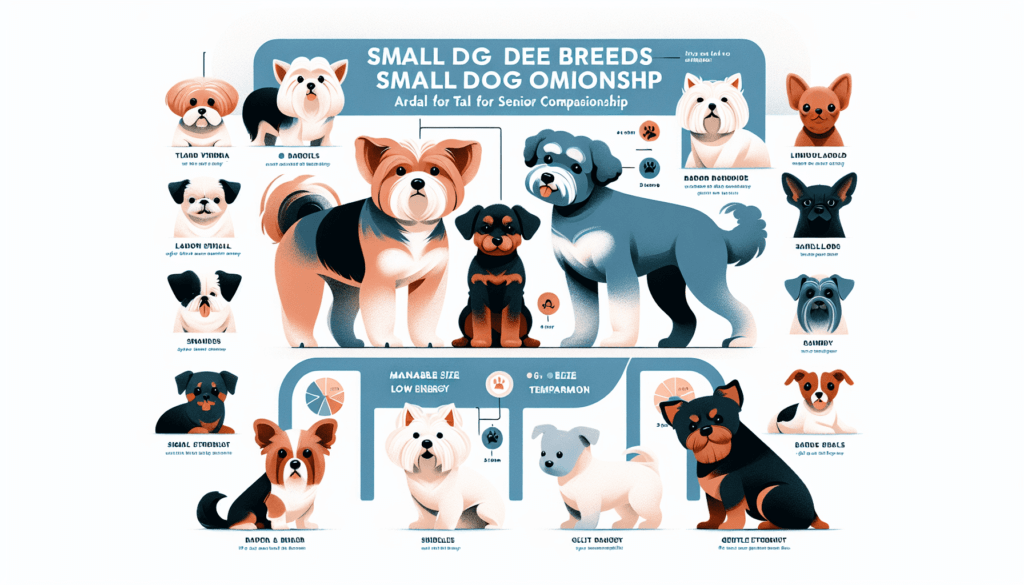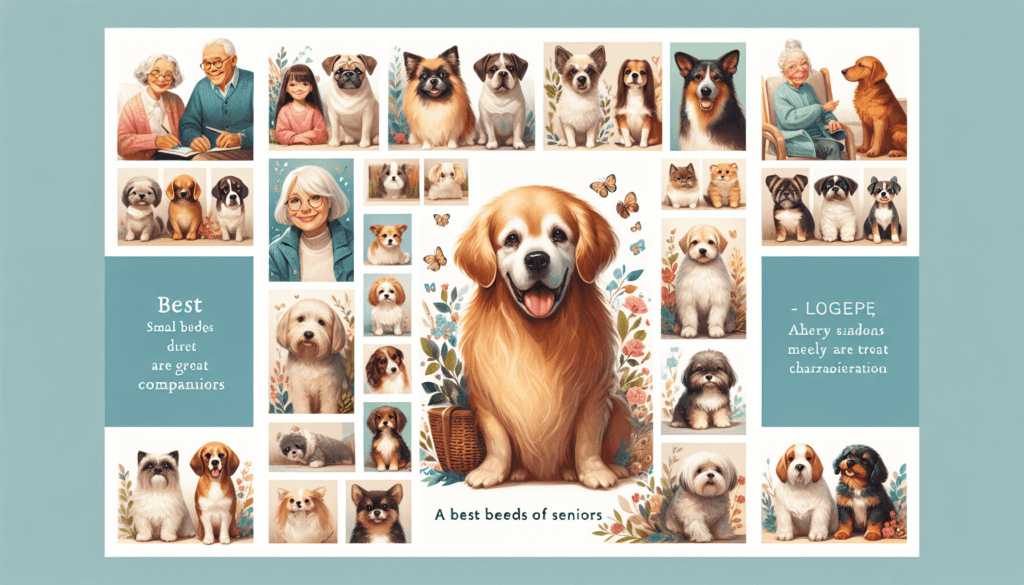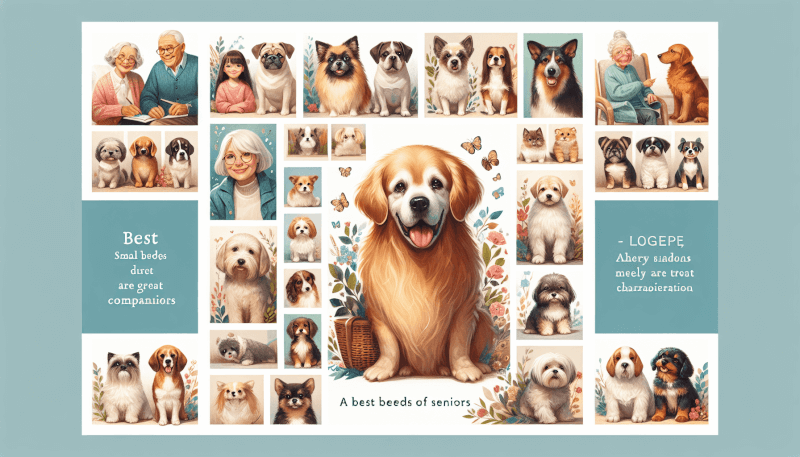Finding the perfect furry companion as a senior can be a delightful journey. If you’re looking for a pint-sized pup to share your golden years with, this article has got you covered. We’ve compiled a list of the best small dog breeds that are not only adorable but also ideal for seniors. From the playful and outgoing Shih Tzu to the affectionate and low-maintenance Pomeranian, these small breeds offer companionship, loyalty, and love in a compact package. So, get ready to embark on a heartwarming adventure and discover the perfect small dog breed that will bring joy and companionship to your life.
Size Considerations
Importance of small size
When it comes to choosing a dog as a senior, size matters. Small breeds are often the ideal choice for seniors because they are more manageable and easier to handle. Their compact size makes them perfect for seniors who may have limited mobility or physical strength. With a small dog, you won’t have to worry about struggling to lift or control them, allowing you to enjoy their company without any added strain or difficulty.
Suitability for seniors with limited mobility
Seniors with limited mobility can greatly benefit from having a small dog as a companion. Small breeds are typically more adaptable to living in smaller spaces, such as apartments or assisted living facilities. Their size allows them to comfortably navigate through tight spaces and smaller rooms. Additionally, small dogs require less exercise compared to larger breeds, making them easier to manage for seniors who may find it challenging to take their pets for long walks.
Temperament and Personality
Calm and gentle nature
Small dog breeds are known for their calm and gentle nature, which can be a comforting presence for seniors. These dogs are often more manageable and easier to control, reducing the risk of accidents or incidents that may occur with more energetic or excitable dogs. Their calm demeanor makes them great companions for seniors who value a peaceful and relaxing environment.
Affectionate and loyal
Small dogs are renowned for their affectionate and loyal nature. They have an incredible ability to form strong bonds with their owners and provide constant companionship. Seniors can greatly benefit from having a small dog by their side, as these furry companions offer unwavering love and support. Whether you’re feeling down or in need of a cuddle, your small dog will always be there to provide comfort and warmth.
Good with children and other pets
If you have grandchildren or other pets in your home, a small dog can be a great addition to your family. Many small breeds are known for their good nature and compatibility with children and other animals. They are often patient and gentle, making them the perfect playmate for younger family members. Small dogs can help foster a sense of responsibility and teach children valuable lessons about caring for another living being.
Adaptability to different living environments
Small breeds are highly adaptable and can thrive in various living environments. Whether you live in a small apartment, retirement community, or have limited outdoor space, a small dog can easily adjust to your living situation. They have a lower exercise requirement compared to larger breeds, which means they don’t necessarily need a large backyard or extensive daily walks. This adaptability makes small dogs an excellent choice for seniors who may have limited mobility or prefer a more relaxed lifestyle.

Exercise and Energy Levels
Low exercise requirements
One of the key advantages of small dogs for seniors is their low exercise requirements. While physical activity is essential for both dogs and humans, small breeds generally need less exercise compared to larger breeds. A short walk around the block or some indoor playtime can often suffice to keep them happy and healthy. This makes small dogs a perfect fit for seniors who may find it challenging to keep up with the exercise needs of a more active dog.
Moderate energy levels
Small dogs often have moderate energy levels, striking a balance between being active and calm. They are typically content with short bursts of activity followed by long periods of rest and relaxation. This can be ideal for seniors who may not have the stamina or energy to engage in extended play sessions or vigorous exercise routines. With a small dog, you can enjoy their company and occasional playtime without feeling overwhelmed by high energy levels.
Health and Longevity
Common health issues in small breeds
While small dogs generally have longer lifespans than larger breeds, they may be prone to certain health issues. Some common health concerns in small breeds include dental problems, obesity, heart conditions, and respiratory issues. However, with proper care, regular vet check-ups, and a balanced diet, these health issues can often be managed and minimized. It’s essential to research specific breeds and consult with a veterinarian to understand the potential health risks associated with any dog you’re considering for adoption.
Longevity and lifespan
On average, small dog breeds tend to live longer than larger breeds. This means that a small dog can be a long-term companion, providing many years of love and companionship. The extended lifespan of small breeds makes them a perfect choice for seniors looking for a lifelong furry friend. It’s important to note that every dog is unique, and individual factors such as genetics, diet, and exercise can influence their lifespan.

Grooming Needs
Low-shedding or hypoallergenic coats
For seniors looking for dogs with low-shedding or hypoallergenic coats, there are many small breeds that fit the bill. Breeds such as the Bichon Frise, Maltese, Shih Tzu, and Poodle mixes often have hair that grows continuously rather than shedding, reducing the amount of hair they leave around the house. These breeds are also less likely to trigger allergies in sensitive individuals, making them a great choice for seniors with allergies or asthma.
Easy grooming routine
Small dogs typically require less grooming compared to larger breeds. Their compact size means there is less area to brush or bathe, making grooming sessions quicker and more manageable. While regular brushing is still necessary to prevent mats and tangles, it is less time-consuming than dealing with the grooming needs of a larger dog. Additionally, some small breeds have hair that doesn’t require frequent haircuts, reducing the need for professional grooming services and saving seniors both time and money.
Trainability and Intelligence
Ease of training
Small dog breeds are often highly trainable due to their intelligence and eagerness to please their owners. With consistent and positive reinforcement training methods, small dogs can quickly learn commands and basic obedience skills. Their small size also allows for easy control during training sessions, making it more convenient for seniors to provide guidance and teach their small companion the necessary skills for a well-behaved pet.
Intelligence and problem-solving abilities
Small dogs may be small in size, but they are not lacking in intelligence. Many small breeds, such as the Pomeranian and Shih Tzu, are highly intelligent and possess problem-solving abilities. This intelligence can make training sessions more engaging for both the dog and the owner, fostering a strong bond and further enhancing the companionship between the senior and their small four-legged friend.
Barking Tendencies
Minimal barking
Excessive barking can be a nuisance, especially for seniors living in close quarters or apartment complexes. Fortunately, many small dog breeds have minimal barking tendencies. While no dog is completely silent, small breeds like the Cavalier King Charles Spaniel and the Boston Terrier are known for their relatively quiet nature. This makes them more suitable for seniors who value a peaceful and harmonious living environment without constant noise disruptions.
Less likely to disturb neighbors
Living in close proximity to neighbors means being considerate of noise levels. Small dogs are less likely to disturb neighbors due to their smaller vocal cords and reduced volume of their barks. Seniors can enjoy the company of a small dog without worrying about constant complaints from neighbors or potential conflicts. This peace of mind allows seniors to focus on the joys of having a small companion by their side.
Affordability
Lower food and healthcare costs
For seniors on fixed incomes, affordability is an essential factor to consider when choosing a dog. Small breeds often come with lower food and healthcare costs compared to larger breeds. Their smaller size means they eat less food, reducing the monthly expenses associated with feeding a pet. Additionally, smaller dogs generally require smaller doses of medication, resulting in lower healthcare costs. These financial savings can make a significant difference for seniors looking to provide quality care for their furry companion without straining their budget.
Suitability for seniors on fixed incomes
Seniors on fixed incomes often need to carefully budget their expenses. Small dogs are a suitable choice for seniors in this situation, as they can provide the much-needed companionship without putting a strain on the budget. The affordability of small breeds, both in terms of food and medical expenses, ensures that seniors can adequately care for their pets without sacrificing other essential needs.
Companionship and Emotional Support
Reduced feelings of loneliness and depression
Loneliness and depression are common concerns among seniors, especially those who live alone or have limited social interactions. Having a small dog as a companion can greatly reduce these feelings of loneliness and provide emotional support. Dogs offer unconditional love, companionship, and a bond that can make a world of difference in the life of a senior. Caring for a small dog also provides a sense of purpose and responsibility, contributing to overall mental and emotional well-being.
Increased social interaction
Walking a small dog can be an excellent conversation starter, leading to increased social interaction for seniors. Taking your furry friend for a stroll in the neighborhood or visiting a dog park allows for spontaneous connections and conversations with fellow dog lovers. These social interactions can help combat feelings of isolation and foster a sense of community. Seniors can form new friendships and find a supportive network of individuals who share a love for their small canine companions.
Specific Small Breeds for Seniors
Chihuahua
Chihuahuas are small dogs with big personalities. Despite their size, they are often confident and lively, providing entertainment and companionship for seniors. Chihuahuas thrive on human companionship and can form strong bonds with their owners. They are relatively low maintenance and have moderate exercise needs, making them suitable for seniors with a variety of lifestyles.
Pomeranian
Pomeranians are tiny bundles of fluff known for their cheerful and extroverted nature. They are playful, affectionate, and highly trainable, making them an excellent choice for seniors who want an active and engaging companion. Pomeranians do require regular grooming to maintain their luxurious coat, but their small size and manageable exercise needs make them well-suited for seniors.
Shih Tzu
Shih Tzus are known for their sweet and loving nature. These small dogs are incredibly devoted to their owners and thrive on affection and attention. They have a moderate energy level and can adapt well to both small and large living spaces. Shih Tzus require regular grooming to keep their coat in good condition, but their gentle temperament and loyalty make them wonderful companions for seniors.
Cavalier King Charles Spaniel
The Cavalier King Charles Spaniel is a small breed known for its friendly and affectionate nature. They are eager to please, making training sessions a breeze. Cavaliers enjoy spending time with their families and are excellent lap dogs. They have low exercise requirements and are generally quiet, making them ideal for seniors who prefer a calm and peaceful living environment.
Bichon Frise
Bichon Frises are small, cheerful dogs known for their friendly and social personalities. They are highly adaptable and can thrive in various living situations. Bichons have a hypoallergenic coat, making them a suitable choice for seniors with allergies or asthma. They do require regular grooming to maintain their fluffy, cotton-like coat, but their loving and happy nature make it all worth it.
Maltese
Maltese dogs are gentle and affectionate companions that thrive on human attention. They are highly adaptable and can adjust to various living environments, including apartments or retirement communities. Maltese have hair that continually grows rather than shedding, providing an option for seniors looking for a low-shedding breed. They do require routine grooming to keep their beautiful coat mat-free and healthy.
Boston Terrier
Boston Terriers are small, lively dogs known for their friendly and outgoing nature. They are excellent family pets and get along well with children and other dogs. Boston Terriers have moderate exercise needs and are generally low-maintenance in terms of grooming. Their compact size and affectionate personality make them a delightful companion for seniors.
Pug
Pugs are small dogs with a big personality. They are known for their playful and friendly nature, making them great companions for seniors. Pugs have moderate exercise requirements and are generally adaptable to various living environments. Their expressive faces and charming personalities make them impossible to resist.
French Bulldog
French Bulldogs are small, stocky dogs known for their affectionate and easygoing nature. They have a friendly disposition and get along well with children and other pets. French Bulldogs require moderate exercise and minimal grooming, making them suitable for seniors with various lifestyles. Their loyal and loving nature makes them a perfect choice for companionship.
Pekingese
Pekingese dogs are small, confident dogs known for their independent and loyal nature. They are devoted to their owners and make excellent companions for seniors. Pekingese require moderate exercise and regular grooming to maintain their luxurious coat. Their regal appearance and head-turning presence make them a unique choice for seniors seeking a small breed with a distinct personality.
In conclusion, small dog breeds offer numerous benefits for seniors. They are well-suited for individuals with limited mobility, provide companionship, emotional support, and increased social interaction. Small dogs have lower exercise requirements, making them suitable for seniors with various lifestyles. Moreover, they often have fewer health issues, lower grooming needs, and are more affordable to care for. With their calm and gentle nature, small dogs make fantastic companions for seniors, providing love, loyalty, and endless joy.


